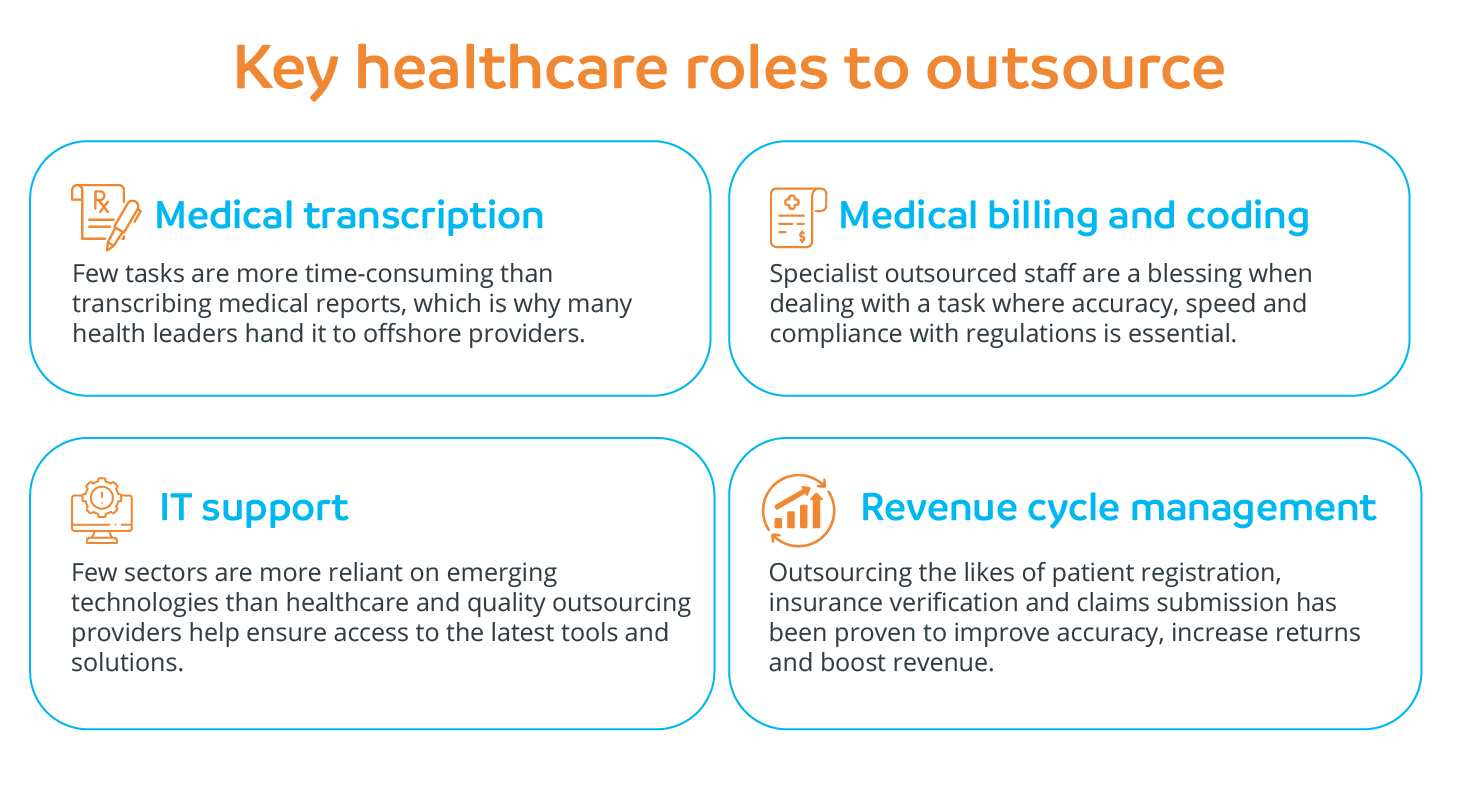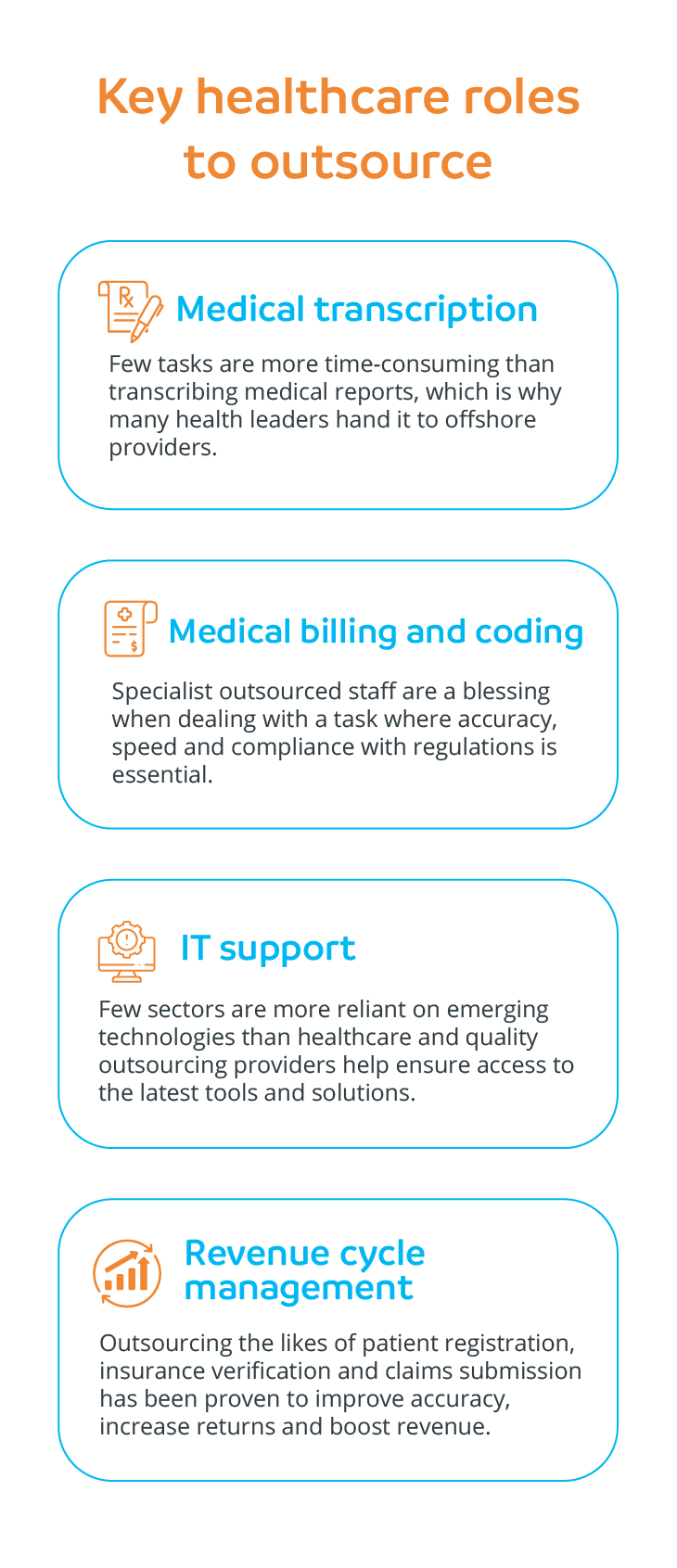How to implement outsourcing in healthcare
In a career spanning more than 30 years, Tina Wheeler has earned a reputation for having her finger on the pulse of the healthcare sector. A partner at ‘Big Four’ accounting firm Deloitte, she leads the strategic direction of the global giant’s healthcare practice and, in her own words, is “deeply committed to helping our clients navigate the ever-changing healthcare landscape”1.

When Wheeler speaks about the healthcare industry, people tend to listen and that is why countless hospital and health service executives would have sat up and taken notice when she started 2024 by declaring outsourcing as one of the leading trends to watch in the coming year.
“You’ve got rising labor costs, higher interest rates and all these financial pressures (so) determining what back-office functions could be outsourced … (is) a huge trend that we see as far as where you can save money,” the respected analyst told Chief Healthcare Executive2.
“I think it’s a delicate dance (but) hospitals need to figure out – health systems, in particular, and maybe even payers – what are they good at and what areas they want to consider outsourcing?
“Everything from revenue cycle, billing, claims, finance, HR, clinical administration, supply chain – all of those things can be entirely or partially outsourced.”
A Deloitte study recently found about 70% of hospital and health system chief financial officers are more concerned about the current economic situation than they were a year earlier3. Their concern is supported by both Fitch Ratings4 and S&P Global Ratings5, which expect non-profit hospitals to see continuing constraints in 2024.
Given such predictions, it is no wonder a growing number of healthcare organizations have signed up for a strategy that can, among other benefits, reduce employment costs by up to 70%. As for those yet to do so, a key question is how do you implement outsourcing in healthcare – and you have come to the right place to find the answer.

Source: Rising Healthcare Costs (pgpf.org)
What is outsourcing in healthcare?
Outsourcing in healthcare sees external teams or individuals assume responsibility by performing certain tasks on behalf of hospitals and health services. Such activities can range from medical billing and human resources to transcription and patient services and result in onshore colleagues being able to dedicate more time and resources to patient care.
The growing popularity of outsourcing in healthcare is reinforced by various studies. Five key findings are:
- The global healthcare outsourcing market is tipped to reach $312 billion by 20256
- 90% of health executives are exploring cost savings by teaming with third-party vendors7
- More than 90% of U.S. hospitals have outsourced at least one of their processes8
- 54% of health CFOs believe outsourcing will increase efficiency and improve their organization’s financial health9
- Almost 75% of hospitals over 300 beds outsource IT services and even more hospitals and health systems with less than 300 beds do the same10.
What are the benefits of outsourcing in healthcare?
Reducing costs may be a significant reason for healthcare organizations to pursue outsourcing but there are many other benefits including:
- Access to talent: in a sector where 71% of healthcare financial leaders say the competition for staff talent is having a negative impact on their operations11, the ability to source highly motivated and skilled workers from offshore destinations is a significant benefit.
- Focus on patient care: outsourcing can literally be a lifesaver as it allows hospitals and healthcare providers to reduce the administrative burden on their in-house workers and, in turn, increase their focus on providing quality patient care.
- Data management: the safe collection of data is essential in the healthcare sector and outsourcing providers that specialize in healthcare combine quality people with leading technology to manage health information with the security, accuracy and speed it deserves.


How do you best implement outsourcing in healthcare?
Healthcare organizations should take several steps when rolling out an outsourcing strategy.
- Identify tasks to be outsourced: outsourcing providers can assist with countless tasks but the key is to determine those that will provide your health service with the best return on investment. Take the time to conduct a deep-dive into your operations with a clear eye on determining those tasks that can be better managed through outsourcing. Options include medical coder, medical transcriptionist, claims analyst, medical billing specialist and quality assurance specialist.
- Do your research: one size does not fit all when it comes to outsourcing. What works for one hospital may not suit another so before rushing to shake hands with an offshore provider, ensure you conduct an extensive research analysis. Request healthcare case studies, seek testimonials from other clients, compare their offering to other providers and do not be afraid to ask questions.
- Establish KPIs: there is a saying that what gets measured gets done and that is never more so than when partnering with an outsourcing provider. Establishing key performance indicators (KPIs) is crucial when working with offshore teams or individuals as they not only keep people accountable but ensure everyone is on the same page regarding expectations.
- Focus on communication: many healthcare services make the mistake of ‘setting and forgetting’ when it comes to outsourcing. Like any relationship, ongoing communication is crucial to success and that means using technologies such as online conferencing, establishing regular check-ins with offshore managers and, where possible, visiting your offshore team to build trust, address issues and gain valuable insights.
Summary
Outsourcing is changing the healthcare sector for the better but success is not guaranteed. Proper planning, a clear vision and quality communication are essential not only when seeking an offshore partner but for the ongoing journey.
The steps outlined above are a great starting point for that journey but there are countless other resources that can assist hospitals and health services when exploring and embracing outsourcing. For example, discover how quality offshore providers are maintaining high standards for HIPAA compliance and ensuring patient confidentiality remains their highest priority.
Reference:
[1] (14) Tina Wheeler | LinkedIn
[2] Hospitals could do more outsourcing in 2024 (chiefhealthcareexecutive.com)
[3] Can Offshoring Help Health Systems Bulk Up Thin Margins? | Deloitte US
[4] Nonprofit hospitals face ‘another tough year’ in 2024, Fitch Ratings says (chiefhealthcareexecutive.com)
[5] Hospital 2024 outlook remains 'negative,' S&P Global Ratings says (chiefhealthcareexecutive.com)
[6] 5+ Interesting Healthcare Outsourcing Statistics - FGC (fgcplus.com)
[7] https://blackbookmarketresearch.newswire.com/news/pressures-of-value-based-care-reforms-trigger-sharp-increase-in-21000011
[8] Healthcare IT Outsourcing & How It Works (plexteq.com)
[9] Hospitals, physicians poll-in on RCM outsourcing: 10 statistics to know for 2016 (beckershospitalreview.com)
[10] Providers to Adopt IT Outsourcing Solutions in 2016 as More Hospitals and Physician Practices Slide Deeper Into Financial Uncertainty, Black Book Survey (prnewswire.com)
[11] Competition for talent emerges as top worry for healthcare leaders (chiefhealthcareexecutive.com)
Popular posts
Browse by topic
- Accounting
- Accounting & Finance
- All Industries
- Banking
- BPO/RPO/HRO
- Communication
- CSR & ESG
- Customer & Client Acquisition
- Customer Experience
- Cybersecurity
- Cybersecurity & Compliance
- Data Management
- Digital Operations
- Digital Transformation
- eCommerce
- Education
- Employee Engagement
- Engineering & Construction
- Financial Services
- Healthcare
- Hospitality and tourism
- HR & Recruitment
- Information Technology
- Insurance
- Legal Services
- Logistics
- Offshoring & Outsourcing
- Outsourcing
- Professional Services
- Real Estate
- Retail & eCommerce
- Startups
- Talent Acquisition and Retention
- Technology
- Trends & Guides
- Workforce Integration
Sign up for the offshoring eCourse
12 in-depth and educational modules delivered via email – for free
Related Posts
Finding value in partnerships: evaluating offshore providers for healthcare cost management
Academic journal The Conversation did not hold its punches when it recently turned its attention to a crisis engulfing the healthcare sector. Beneath..
How to improve patient experience in healthcare
It says a lot about the economic realities of modern-day health care that one of America’s most prestigious learning institutions has a course..
Is offshore staffing the key to data compliance?
With entire websites dedicated to exposing businesses daily that have been hacked or have had their data breached daily, it’s no wonder why data..
